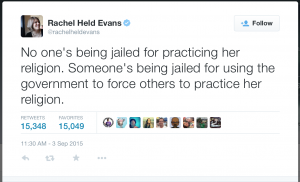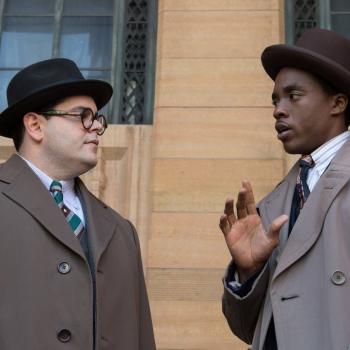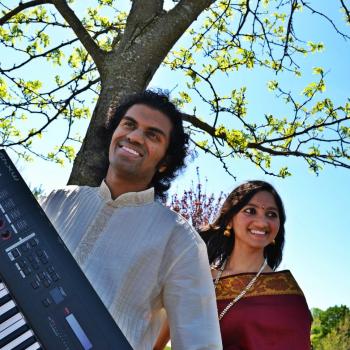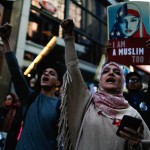I learned with relief that the first gay couple in Kentucky received their marriage license, but not without disappointment that Rowan County Clerk

Kim Davis was jailed – and that her husband says she will not “bow down.” Surprising, since one would expect expect Kim Davis to be humble and compassionate – she is reportedly a born-again Christian and follows Christ. But it is Ms. Davis’ position as an elected official of the government, not her personal beliefs, that requires her to abide by the laws she actually agreed to uphold. The argument for religious freedom does not allow Ms. Davis to continue along the path of refusal or denial: our First Amendment protects religious freedom, and it also promotes pluralism. And we can see in this case, pluralism can be messy and difficult, reinforcing the merits of keeping church and state separate. The value of bringing faith into the public square is something I have wrestled with for the last decade.
More than ten years ago, there was contention over the City of Troy’s National Day of Prayer, and whether all religions should be represented, and how. I was asking for inclusion in a city-sponsored National Day of Prayer event. An employee in the clerk’s office had an approach not dissimilar from Ms. Davis: only followers of the Nicene Crede could participate in the City’s 11th Annual National Day of Prayer, according to the event website and a resolution she proposed. Troy is home to one of the largest and oldest Hindu temples in the state, to a reform synagogue. One in five city residents were born in other countries, predominantly South Asian and Asian Pacific countries – guaranteeing its religious diversity was beyond the exclusivity of “Judeo-Christian” of the City Proclamation proposed in 2005.
Suhag Shukla, legal counsel and Executive Director at the the Hindu American Foundation (HAF) reached out to me. A lawyer and co-founder of HAF, Suhag oversaw the Foundation’s initial forays into issues of church-state separation, something which she continues to do. She also writes on issues of church-state separation such as the recent one in Arkansas, involving the Ten Commandments, Hanuman, and possibly Baphomet. Her support was not needed in the Troy situation, as we had a local lawyer who joined the debate, and the City Council decided the event would no longer be city-sponsored. Any group who wanted to organize an event of their own was free to apply for a permit to use the steps of City Hall, ensuring both religious freedom and free speech – but not exclusion. The community leaders who gathered also decided that we would celebrate in a house of worship, and that we would welcome everyone. After all, doesn’t pluralism mean that if you include one, you include all?
This community group, now formally known as the Troy-area Interfaith Group, actively works for inclusion and understanding in the community, in order to promote pluralism – and provides opportunities for people to get to know their neighbor – and about their neighbor’s faith. The organization’s annual National Day of Prayer and other events have been held in a church, in a gurudwara, a mosque, a synagogue, in a temple – but not in the public square. The group which organized the event on the steps of City Hall continues to do so, but not under the City’s official banner.
While not every city or region has an active interfaith group or efforts underway to help promote pluralism and improve religious understanding, a recently launched initiative of Americans United for the Separation of Church and State (AU) can help with protecting religious freedom and pluralism. Its name is simple: Protect Thy Neighbor; as is its tag line: Because Religion is No Excuse to Harm Others. But it is this clearly crafted explanation about the project that explains the challenges of bringing religion into the public square, and the resulting need for communities to work against exclusion:
Americans United for Separation of Church and State launched Protect Thy Neighbor because we are seeing more and more attempts to use religion to discriminate and deny people their rights. For years we have been working in the courts, legislatures, and on the ground to oppose these attempts to abuse religious freedom. With Protect Thy Neighbor, we are devoting even more resources to win this fight. We are expanding our work in the state legislatures, Congress, and the courts so that no one is allowed to use religion as an excuse to refuse you service, deny you healthcare, or threaten your safety. We are protecting our neighbors.
Based on my decade of interfaith activism, the road ahead is rocky and requires lots of effort and engagement. With initiatives from leading civil rights and church-state separation agencies like ACLU and AU, and interfaith groups like the ones we have in Southeastern Michigan, perhaps we can promote pluralism and protect religious freedom. But interfaith groups like the Troy-area Interfaith Group are possible only when neighbors and communities come together – when people show compassion, and are moved by the idea of helping the other, not refusing to understand.














